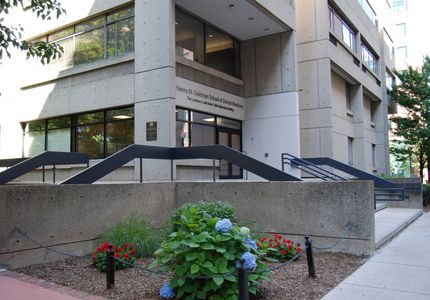GSDM Teams up With Tufts and Harvard to Combat Opioid Crisis

Massachusetts Governor Charlie Baker announced at a press conference on Thursday, February 11, 2016, that Boston University Henry M. Goldman School of Dental Medicine (GSDM) will be working with Harvard University School of Dental Medicine and Tufts University School of Dental Medicine—in coordination with the Massachusetts Dental Society—to implement a first-in-the-nation set of dental education core competencies to prevent and manage prescription drug misuse and abuse. Dean Jeffrey W. Hutter stood behind the governor in support with Dean Bruce Donoff of Harvard at the press conference; Dean Huw Thomas of Tufts was not able to attend.
The three dental schools will be working to ensure their existing curricula includes the primary, secondary, and tertiary core competencies of this new initiative: preventing prescription drug misuse; treating patients at risk for substance abuse disorders; and managing substance abuse disorders as a chronic disease.
“This set of core competencies will ensure that the commonwealth’s more than 1800 enrolled undergraduate (sic) dental students and 550 advanced graduate dental students receive enhanced training in primary, secondary, and tertiary strategies for the prevention and management of prescription drug misuse,” Governor Charlie Baker announced during the press conference on Thursday, February 11, 2016.
The new initiative is similar to a partnership that began in November 2015, which provides the same training in prevention strategies to the more than 3,000 enrolled medical students in Massachusetts.
GSDM faculty member Dr. Richard D’Innocenzo served as GSDM’s representative on the Dental Education Working Group on Prescription Drug Misuse, which helped coordinate the establishing of this new initiative. Dr. D’Innocenzo, who attended the press conference on February 11, 2016, is a Clinical Professor in Oral & Maxillofacial Surgery and Director of Pre-doctoral Education in the Department of Oral & Maxillofacial Surgery, and Vice Chairman of Dentistry and Oral & Maxillofacial Surgery at Boston Medical Center.
“The undertaking of this most important initiative will reinforce the foundational aspects of pain management and substance abuse recognition that are presently provided in the curriculum, provide for evaluation with proper consultation and referral, and help eliminate the stigmata associated with substance abuse,” said Dr. D’Innocenzo. “We look forward to the intra and inter-professional educational experiences, which will be beneficial to all involved.”
Along with Governor Baker, Dr. David Keith of Massachusetts General Hospital spoke during the press conference about the new initiative, and the state of opioid abuse and misuse in the commonwealth.
“The fact is that over 80 percent of those prescriptions which are diverted or misused come from prescriptions written by physicians and dentists,” said Dr. Keith. “This is a unique opportunity that the governor has given us to come together to educate our dentists and advanced dental trainees in the correct prescribing of opioids.”
With the new initiative, the three dental schools will make the necessary additions to their curricula in order to ensure that their students are properly educated on the initiative’s core competencies.
The primary core competency, preventing prescription drug misuse, will teach students to evaluate a patient’s level of pain and risk for substance use disorders, and to identify all potential pharmacological and non-pharmacological treatment options.
The secondary core competency, treating patients at risk for substance use disorders, will teach students to properly refer patients to all necessary health professionals, practice pain management treatment plans, provide special attention to safe prescribing and recognizing patients displaying signs of aberrant prescription use behaviors, and to demonstrate foundational skills in patient-centered counseling and behavior change.
The tertiary core competency will teach students to understand all currently available screening instruments for at-risk patients, work toward eliminating the stigma associated with substance misuse, and develop models of inter-professional education where medical professionals can engage in collaborative training to facilitate best practices and optimal care.
“This new initiative is a crucial step in ensuring that dental professionals are adequately educated about the increasing problem of opioid abuse and misuse in America,” said Dean Jeffrey W. Hutter. “GSDM is proud to be working with Harvard University School of Dental Medicine, Tufts University School of Dental Medicine, and the Massachusetts Dental Society on this important and necessary initiative.”